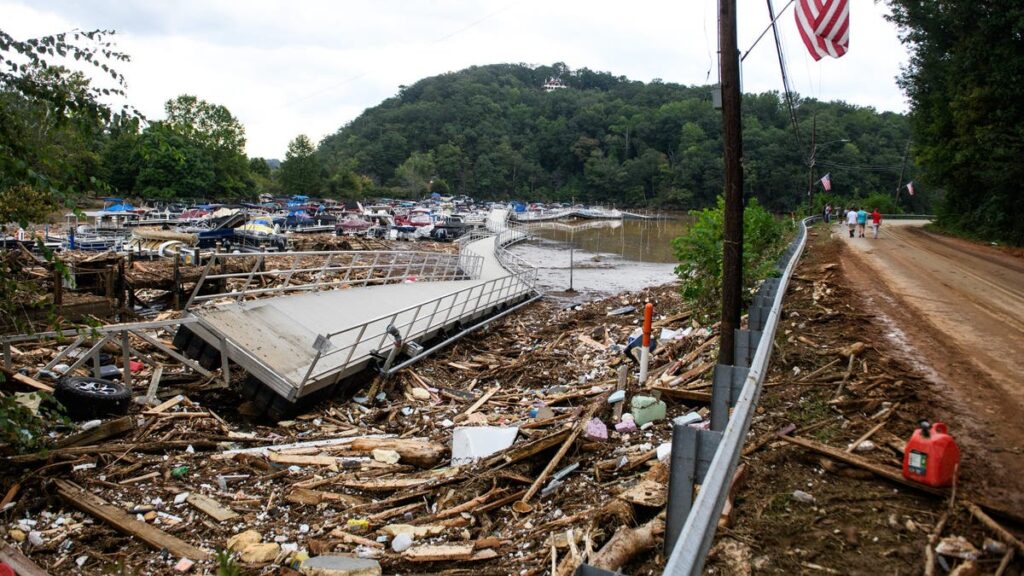
Appalachia is still recovering following Hurricane Helene’s widespread damage and the federal government’s efforts have been missing or inefficient.
When I was visiting my family for Christmas just a few weeks ago, I had the opportunity to partner with a local church and deliver Christmas gifts and supplies to families in my home county of less than 20,000 people, nestled in the North Carolina and Tennessee border.
This experience gave me the opportunity to listen to the stories of my neighbors, many of whom I have known for my entire life.
One story stuck out to me. A multi-generation household of six living in a fifth-wheel trailer. They had lost their home and everything they cherished — except their faith.
Unfortunately, their story is all too familiar throughout the small mountain communities of Southern Appalachia.
It has been almost five months since Hurricane Helene forever reshaped the Blue Ridge Mountains of Western North Carolina.
In the months since, we have seen the true nature of humanity.
Our community has come together. Businesses are helping each other clean out and rebuild. Churches are still delivering warm clothes and hot meals on foot and horseback. Nonprofits from across the southeast are delivering necessary supplies such as diapers, blankets, and baby formula.
It was Elon Musk, with the help of private citizens like former NASCAR driver Greg Biffle and the Cajun Navy that delivered Starlink routers to every crevice of Western North Carolina, connecting us with the outside world.
Western North Carolina and Southern Appalachia are rebuilding on their own.
The federal government has been slow to respond and help despite the incredible efforts of leaders like Congressman Chuck Edwards and Senators Thom Tillis and Ted Budd.
Partisan politics have slowed relief efforts, with many in Raleigh and Washington putting party over people.
With temperatures plummeting and inches of snow falling every week, many North Carolinians remain unhoused, relying on tents for shelter.
FEMA has delivered trailers to the region but failed to efficiently approve those who applied to obtain them nearly five months ago.
The shining light through this storm is the resilience of Appalachia. Despite instigators on both sides trying to use this disaster for their own political gain, our communities have come together and helped each other out.
Towns like Marshall, North Carolina, are planning to reopen in the coming months despite more than half of the town being destroyed by the floodwaters.
In the more than 25 years that I have called Western North Carolina home, we are stronger than I have ever seen before.
However, the strength and resilience of our community can only sustain our perception of normalcy for so long.
Western North Carolina is in desperation.
Leaders on both sides of the aisle need to hold accountable the government bureaucracy that is defying the needs of our communities.
Winter is only just beginning. With temperatures dipping into the single digits and windchills in the negatives, churches and nonprofits are leaping into action to fill the ever-so-present void left by inefficient government red tape.
The time to act was five months ago, but late action is better than no action.
CLICK HERE FOR MORE FOX NEWS OPINION
Our community desperately needs investments in affordable housing and infrastructure to boost our local economies and give families the resources they need to get back on their feet.
Insurance companies are redefining flood zones; many families are being priced out of their homes and properties. The Small Business Administration is running out of money, slowing recovery in regions desperately needing economic opportunity. And county and municipal governments are relying on the slow distribution of disaster relief funds to get critical agencies back online.
This is not a political issue and should not be controversial. For more than 100 years, Appalachia has been left behind by our federal government. Now, when we need them the most, they still cannot be bothered to act with urgency.
Appalachia will not defined by Helene; it will be defined by the overwhelming response of the people who call these mountains home.